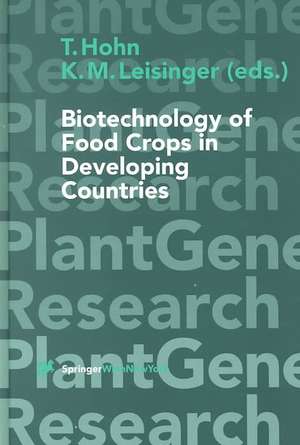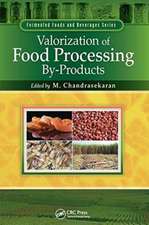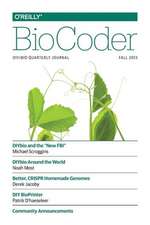Biotechnology of Food Crops in Developing Countries: Plant Gene Research
Editat de T. Hohn, K.M. Leisingeren Limba Engleză Hardback – 29 noi 1999
| Toate formatele și edițiile | Preț | Express |
|---|---|---|
| Paperback (1) | 385.08 lei 6-8 săpt. | |
| SPRINGER VIENNA – 4 oct 2012 | 385.08 lei 6-8 săpt. | |
| Hardback (1) | 392.75 lei 6-8 săpt. | |
| SPRINGER VIENNA – 29 noi 1999 | 392.75 lei 6-8 săpt. |
Preț: 392.75 lei
Nou
Puncte Express: 589
Preț estimativ în valută:
75.16€ • 77.65$ • 62.55£
75.16€ • 77.65$ • 62.55£
Carte tipărită la comandă
Livrare economică 25 martie-08 aprilie
Preluare comenzi: 021 569.72.76
Specificații
ISBN-13: 9783211832400
ISBN-10: 3211832408
Pagini: 248
Ilustrații: XI, 227 p.
Dimensiuni: 155 x 235 x 19 mm
Greutate: 0.53 kg
Ediția:1999
Editura: SPRINGER VIENNA
Colecția Springer
Seria Plant Gene Research
Locul publicării:Vienna, Austria
ISBN-10: 3211832408
Pagini: 248
Ilustrații: XI, 227 p.
Dimensiuni: 155 x 235 x 19 mm
Greutate: 0.53 kg
Ediția:1999
Editura: SPRINGER VIENNA
Colecția Springer
Seria Plant Gene Research
Locul publicării:Vienna, Austria
Public țintă
ResearchCuprins
The Contribution of Genetic Engineering to the Fight against Hunger in Developing Countries.- I. Introduction.- II. The Political Economy of Hunger.- III. The Risks of Genetic Engineering in the Fight against Hunger.- IV. The Benefits of Genetic Engineering in the Fight against Hunger.- V. Building Blocks for Food Security.- VI. Conclusion.- VIL References.- Networking Biotechnology Solutions with Developing Countries: the Mission and Strategy of the International Service for the Acquisition of Agri-Biotech Applications.- I. Background: the Challenge.- II. Creation of ISAAA: the Institutional Response.- III. The Program.- IV Biosafety Regulatory Development: a Special Case.- V. The Strategy.- VI. The Organization.- VII And Who Benefits?.- VIII. References.- Socioethical and Sociopolitical Reflections on the Application of Gene Technology in Developing Countries.- Gene Technology for Increased Rice Production in Developing Countries.- I. Introduction.- II. Increasing Rice Production.- III. The Quality of the Rice Grain.- IV. Conclusions.- V. References.- Biotechnology for Maize and Wheat Improvement in Developing Countries: a Need, a Reality, or a Dream?.- I. Introduction.- II. Maize as an Important Target for Genomics.- III. Wheat and Its Relatives as Important Targets for Genomics.- IV. Approaches to Studying the Molecular Diversity of Maize and Wheat.- V. Molecular Genetics of Maize.- VI. Molecular Markers in Wheat.- VII. Possibilities for Marker-Assisted Selection.- VIII. Genetic-Engineering Achievements in Maize.- IX. Genetic Engineering in Wheat.- X. Conclusion.- XI. References.- Gene Transfer in Sugarcane.- I. Introduction.- II. Genetic Transformation.- III. Agricultural Traits.- IV. Industrial Traits.- V. Somaclonal Variation and Integration of Transgenic Plantsinto the Sugarcane Breeding Program.- VI. Risk Assessments.- VII. Conclusions.- VIII. References.- Gene Technology for Potato in Developing Countries.- I. Introduction.- II. Potato Production Constraints in Less-Developed countries.- III. Biotechnology Challenges and Opportunities.- IV. Possible Limitations.- V. Conclusions.- VI. References.- Genetic Biotechnologies and Cassava-Based Development.- I. Introduction: Cassava’s Links to Development Objectives.- II. The Cassava Biotechnology Network.- III. Cassava Biotechnology Research Priorities Derived from Expressed Needs of Farmers.- IV. Cassava Biotechnology Research.- V. Cassava Biotechnology Tools in Support of Farmer-Participatory Research.- VI. Implications of Cassava Biotechnology Research for the Second Green Revolution.- VII. Conclusion.- VIII. References.- Underresearched Tropical Food Crops: Cowpea, Banana and Plantain, and Yams.- I. Introduction.- II. Cowpea.- III. Banana and Plantain.- IV. Yams.- V. Conclusion.- VI. References.
Recenzii
"... As the chapters are written by most recognised experts of their respective fields excellent overviews on the recent level of gene technology applied to food crops can be obtained easily. A book for everyone really interested in the application of gene technology to plants, not only in developing countries !" Lebensmittel und Biotechnologie"This book achieves a good balance of background scientific information on food crops in developing countries and information on the social environment which has given these crops their importance to a particular society ... It is a strength of this book that the scientific chapters also attempt to cover the socio-political aspects ..." BioTeCH forum"The first chapters of the book discuss the ethical and socio-political aspects of crop improvement ... It is a strength of this book that the scientific chapters also attempt to cover the socio-political aspects ... presented in the early chapters. For most of the crops discussed ... the analysis of the science is accompanied by a discussion on risk assessment, biosafety and programs for farmer participation in defining goals and priorities of research programs." BIO WORLD
































